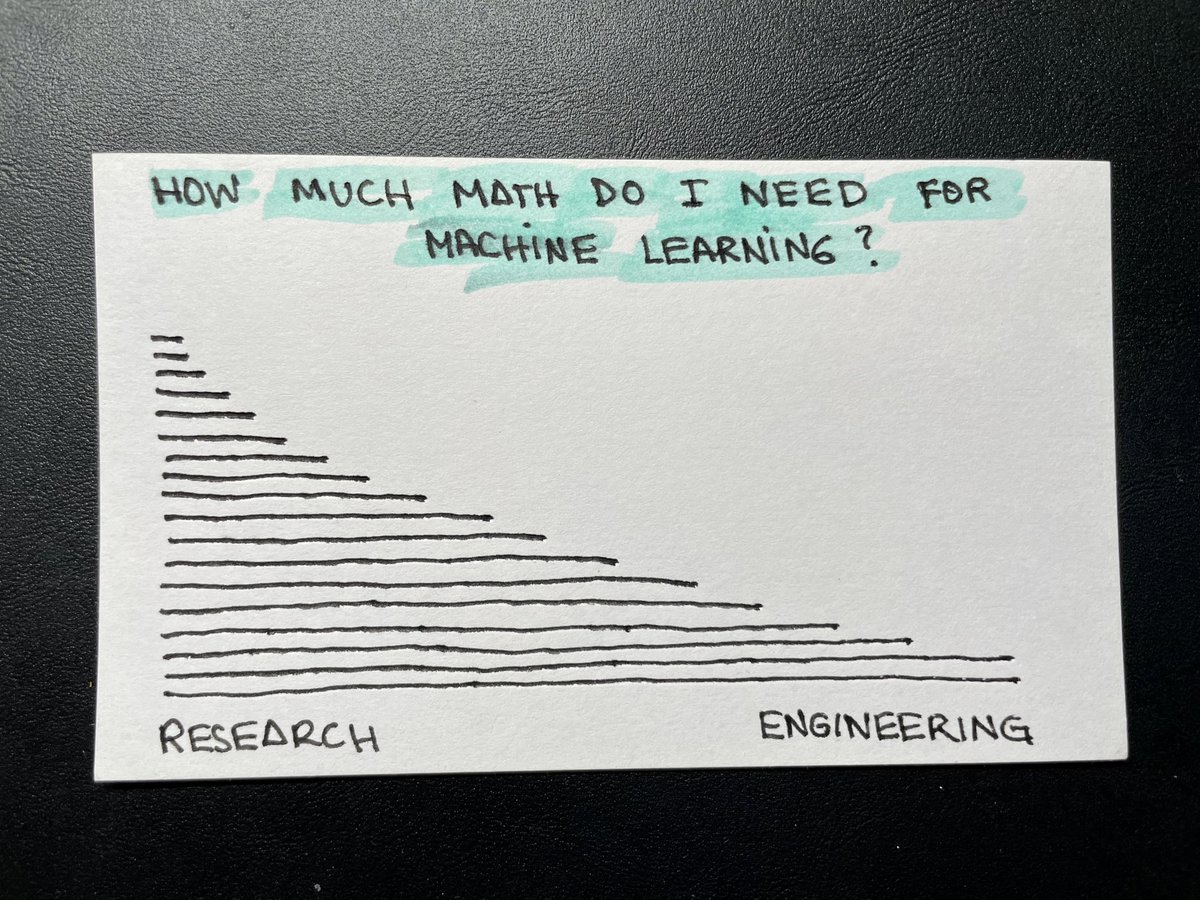The one million dollar question:
"Is it reasonable for someone to dive into machine learning with a shallow knowledge of math?"
 The short answer is "yes."
The short answer is "yes."
 The more nuanced answer is "it depends."
The more nuanced answer is "it depends."
Let me try and unpack this question for you.


"Is it reasonable for someone to dive into machine learning with a shallow knowledge of math?"
 The short answer is "yes."
The short answer is "yes." The more nuanced answer is "it depends."
The more nuanced answer is "it depends."Let me try and unpack this question for you.


You can think about machine learning as a spectrum that goes all the way from pure research to engineering.
The more you move towards a research position, the more you can benefit from your math knowledge. If you move in the other direction, you'll get away with less of it.

The more you move towards a research position, the more you can benefit from your math knowledge. If you move in the other direction, you'll get away with less of it.

I have friends that got a Ph.D. and became college professors.
For them, math is an absolute requirement!
Not only are they working on research projects, but they are teaching the next generation of scientists and engineers.

For them, math is an absolute requirement!
Not only are they working on research projects, but they are teaching the next generation of scientists and engineers.

Other friends went the other direction: they took positions at companies that focus on exploiting existing high-level frameworks to produce value.
A lot of the math required is already abstracted away by these libraries. They can get away with much less knowledge.

A lot of the math required is already abstracted away by these libraries. They can get away with much less knowledge.

Notice that I didn't say that you don't need math *at all*. I specifically framed the initial question as having a "shallow knowledge" of it.
It's tough to escape from math, regardless of what you do in life. Machine learning is no exception.

It's tough to escape from math, regardless of what you do in life. Machine learning is no exception.

I'm an engineer. This is my experience:
 Basic knowledge of statistics and probabilities is essential for what I do.
Basic knowledge of statistics and probabilities is essential for what I do.
 Understanding derivatives much less so.
Understanding derivatives much less so.
 Linear algebra comes up all the time, but it's easy to refresh concepts when I need them.
Linear algebra comes up all the time, but it's easy to refresh concepts when I need them.

 Basic knowledge of statistics and probabilities is essential for what I do.
Basic knowledge of statistics and probabilities is essential for what I do. Understanding derivatives much less so.
Understanding derivatives much less so. Linear algebra comes up all the time, but it's easy to refresh concepts when I need them.
Linear algebra comes up all the time, but it's easy to refresh concepts when I need them.
I want you to keep this in mind:
 You can get started with a much shallower knowledge of math than what would be required for a job.
You can get started with a much shallower knowledge of math than what would be required for a job.
Part of the process is to learn what you need!
This is probably the most relevant piece of advice that always gets lost in translation.

 You can get started with a much shallower knowledge of math than what would be required for a job.
You can get started with a much shallower knowledge of math than what would be required for a job.Part of the process is to learn what you need!
This is probably the most relevant piece of advice that always gets lost in translation.

If today is your first day getting on the machine learning train, I promise you can get away with basic high school level math.
In a year, you'll need more than that. But that will happen gradually.

In a year, you'll need more than that. But that will happen gradually.

Remember when you were learning to ride a bicycle?
If you look back and try to think logically about it, there are so many things you probably *wish* you knew before starting.
But you didn't.
And you learned.
And everything turned out okay.

If you look back and try to think logically about it, there are so many things you probably *wish* you knew before starting.
But you didn't.
And you learned.
And everything turned out okay.

Let's wrap up this with a TLDR;
 You can get started with very little math.
You can get started with very little math.
 As you progress, you'll incorporate more of it.
As you progress, you'll incorporate more of it.
 Your specialization will determine how much.
Your specialization will determine how much.
More important than anything:
GET. STARTED. Don't overthink it.
 You can get started with very little math.
You can get started with very little math. As you progress, you'll incorporate more of it.
As you progress, you'll incorporate more of it. Your specialization will determine how much.
Your specialization will determine how much.More important than anything:
GET. STARTED. Don't overthink it.
I finish work every day around 5 pm. Then I come here to share some of the things I've learned.
Every day

If you don't mind a blunt and practical point of view about machine learning and software engineering, stay tuned!
Every day


If you don't mind a blunt and practical point of view about machine learning and software engineering, stay tuned!

 Read on Twitter
Read on Twitter


